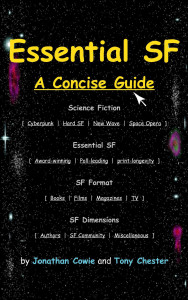 Take a huge group of science fiction fans. Ask them what they think are the most important books, films, TV shows and conventions. You’ll get some strong opinions. Trying to come up with a “Greatest Hits” of any kind is difficult work, but the authors of Essential SF give it a shot. The result is a helping hand for anyone who would like to get a general feel for this genre. The entries are based on fan input gleaned from many different sources, including Hugo awards, Locus reader polls and popular convention offerings. More than a “what to read and watch,” it also provides a Who’s Who of popular SF authors as well as a listing of the more well-known genre conventions and fanzines.
Take a huge group of science fiction fans. Ask them what they think are the most important books, films, TV shows and conventions. You’ll get some strong opinions. Trying to come up with a “Greatest Hits” of any kind is difficult work, but the authors of Essential SF give it a shot. The result is a helping hand for anyone who would like to get a general feel for this genre. The entries are based on fan input gleaned from many different sources, including Hugo awards, Locus reader polls and popular convention offerings. More than a “what to read and watch,” it also provides a Who’s Who of popular SF authors as well as a listing of the more well-known genre conventions and fanzines.
I jumped at the chance to review this book; I’m a big fan of fantasy and horror, but my science fiction knowledge is spotty at best. Babylon 5, Star Wars and Star Trek: The Next Generation have been my touchstones, with Dune and a few Ursula Le Guin novels thrown in for good measure. And the less said about my attempt to comprehend Mona Lisa Overdrive, the better. A guide that listed what fans thought aspiring fans needed to know about their genre sounded like a great idea. And it is. After reading this guide, I may not be a fan’s fan, but the fear of making a horrible SF gaffe is gone (though a gaffe on my part is not impossible).
Being on the cutting-edge of SF fandom isn’t this guide’s objective, though. Essential SF starts with a well-written description of what science fiction is and what it isn’t. It goes on to provide an alphabetical listing of the most popular aspects of the genre, including a few definitions of terms often used by fans and magazines. The guide ends with a “Collector’s Core Checklist” that readers can use to mark off what they’ve already seen or read. Some of the entries I know from my love of other genres, like author Dan Simmons, the movie Aliens and the EC comic Weird Science. It’s interesting to see these items described from a science fiction standpoint, and my appreciation of these authors and items feels a little more well-rounded. A few of my favorite shows didn’t warrant a listing (Battlestar Galactica? The Six Million Dollar Man?), but again, this is a primer.
This guide provides basic knowledge so the “average person” can get a feel for what is most popular in this genre. I said most popular, not best, and in this instance there is a difference. The authors stress that difference and point out that there are many different guides that list the best of science fiction; reference books that give readers complete listings of any and all “great” works of the genre. This guide deals with accessibility as well as popularity, omitting popular works that may be out-of-print or otherwise unattainable, and focusing on items that the new or inexperienced SF reader can easily obtain. I believe that’s a good idea for a guide like this; all the description in the world isn’t going to help you get your hands on a brilliant, award-winning novelette that is out-of-print. Save that kind of information for fans who already have a basic knowledge and want to search for a Holy Grail.
Essential SF packs a lot of information into 268 pages. But it doesn’t feel swamped by excess nor is it uselessly brief. It’s a handy reference guide that can be picked up and leafed through any time you need information about the most popular aspects of science fiction fandom. It’s also useful if you’re just looking for an interesting book to read or film to watch. The introduction by Vince (Vin¢) Clarke says, “[this book] is intended to serve you. For you to carry around bookshops, libraries and conventions.” And that would be a perfect use for it. I’ve already highlighted several books that I’d like to read, and the checklist in the back of the book is marked with the items I’ve already gotten to know.
Thanks to this guide, I’m ready to take the next step; maybe a novel by Connie Willis? So don’t be surprised if you see me at the local bookstore looking outside of my usual aisles for a good read. Thanks to Essential SF, this time I’ll be standing in the science fiction section, clutching a small black paperback with an eager look on my face.
(Porcupine Press, 2005)
